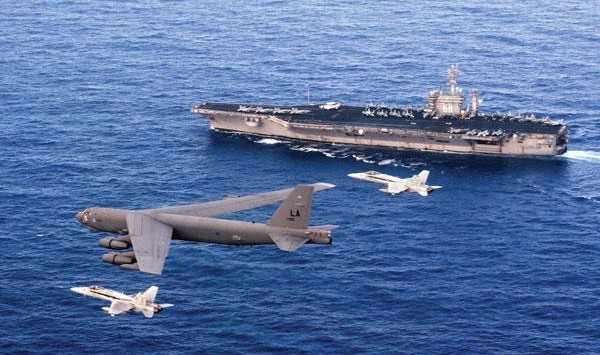Nautilus Peace and Security Weekly Report Contributor’s blog entry for Energy Security
Go to the Weekly Report for 6 September 2012
Go to Peter Hayes’ Policy Forum on the same topic
These days, airlines fly direct to DC, and the diplomatic power of CINCPAC, the commander-in-chief of the entire Pacific Command based in Hawaii, has receded relative to that of American decision-makers in Washington DC. Moreover, the instantaneous oversight, sometimes supervision, sometimes direction of military operations from the White House and other regional command centers via networked command and control, computers, communications, intelligence, surveillance and reconnaissance systems known awkwardly as C4ISR often bypasses CINCPAC. CINPAC can listen in, but he can’t run the show.
Today, the centrifugal operations of far-flung US service strain at the leash to deploy new military technologies and to run their own shows on a global basis. The Airsea Battle Office was created on November 9, 2011 by the Joint Chiefs precisely to develop joint strategy between the US air force and the navy—thereby, as noted by Bill Gertz, further reducing CINCPAC’s supervisory authority over the services in this region.
The resultant “pivot” strategy declared by the Obama Administration to overcome adversarial “anti-access, area-denial” capacity—above all by China along its eastern seaboard– is justified as multiplying force gained from greater basing flexibility, maneuverability, and ability to be inter-operable across services and with allied forces.
In reality, much of this activity is driven by the ever-tightening budget screws that follow the bureaucrat’s golden rule: “He who has the gold, rules.” The increased deployment of US marines to Darwin in Australia, for example, actually moved these forces away from Chinese firepower as well as prospective sites of intervention but created a new political-symbolic US presence in the South Pacific—at least in the minds of Chinese and Southeast Asian leaderships.
Ironically, this move was also driven by the US marines desire to protect their units in the West Pacific from budget cuts by “embedding” them in a key alliance relationship—a smart bureaucratic maneuver dressed up as big picture strategy.
As former CINCPAC Admiral Denis Blair stated forthrightly, AirSea Battle “is nothing new, in typical American fashion we often pour the old wine into new bottles with fancy new labels.”
”But the navy and air force co-operating to be able to get to our allies that are within range of Chinese missiles is nothing new, and most Americans expect that to be their job.”
In short, old sea dogs are sailing into new geostrategic and bureaucratic battles in the west Pacific with fancy labels on them–but nothing new in terms of a strategy that would engage China as an equal partner in a concert rather than a balance of powers.
– Peter Hayes, NAPSNet Contributor
The Nautilus Peace and Security Weekly Report presents articles and full length reports each week in six categories: Austral security, nuclear deterrence, energy security, climate change adaptation, the DPRK, and governance and civil society. Our team of contributors carefully select items that highlight the links between these themes and the three regions in which our offices are found—North America, Northeast Asia, and the Austral-Asia region. Each week, one of our authors also provides a short blog that explores these inter-relationships.


